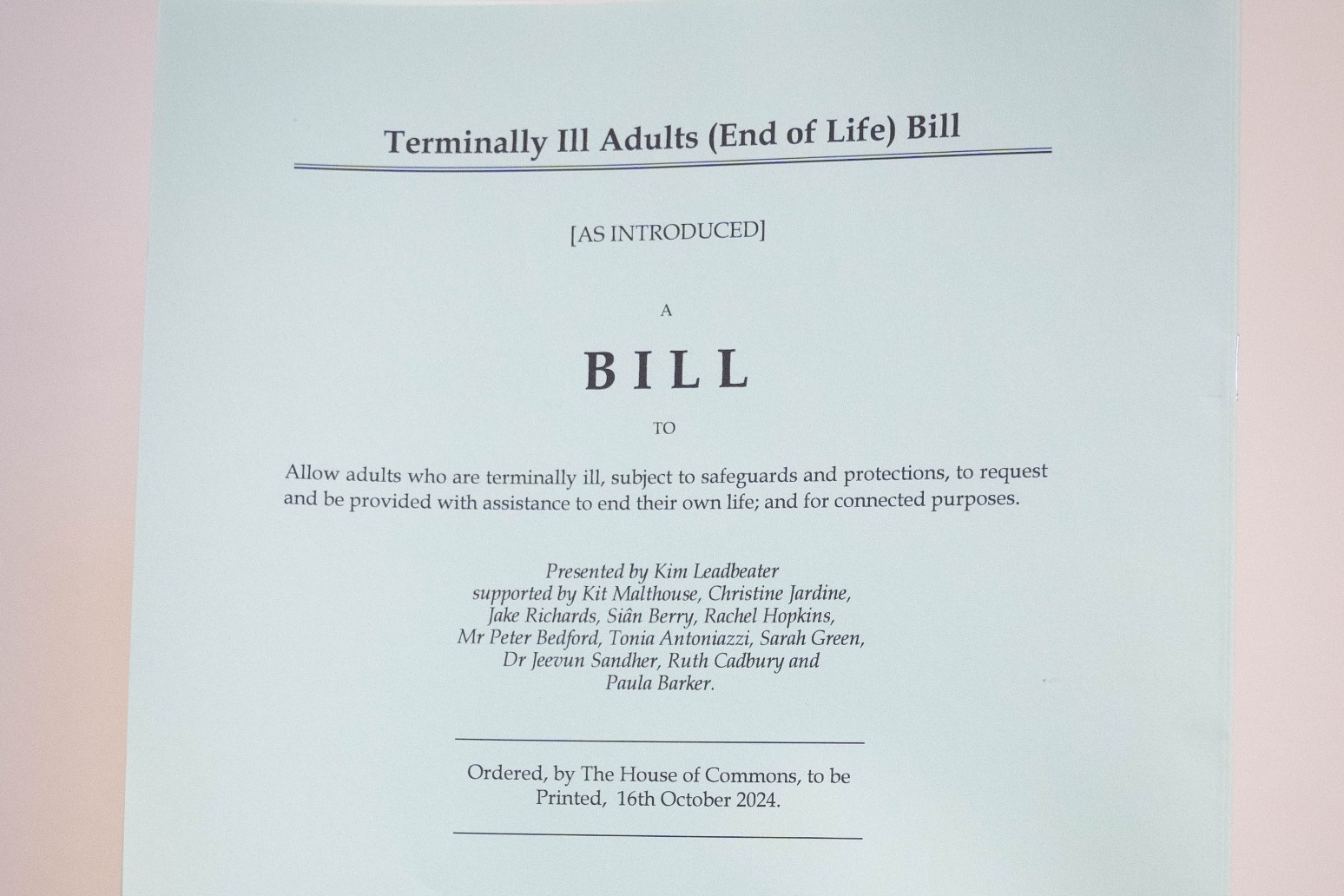-
 play_arrow
play_arrow
Kl 1 Radio Local radio for west Norfolk
-
 play_arrow
play_arrow
KL DISCO KL Disco Playing Disco Music from the 70's onwards.24/7
-
 play_arrow
play_arrow
KL COUNTRY KL COUNTRY Playing New and Classic Country Music 24/7
-
 play_arrow
play_arrow
KL ROX KL ROX The best of New and Classic Rock.24/7
-
 play_arrow
play_arrow
KL SUMMER Summer Vibes 24/7 from KL1 Radio across West Norfolk
-
 play_arrow
play_arrow
KL CLASSICAL Your Symphony Starts Here
-
 play_arrow
play_arrow
KL CHILL Just Chill!
-
 play_arrow
play_arrow
KL POP The Best POP Hits all day Long!
-
 play_arrow
play_arrow
KL XTRA KL XTRA
music_note
Assisted dying can correct injustice says Leadbeater as opponents warn of risks


Parliament has a chance to “correct injustice and reduce human suffering” when it debates assisted dying, the MP behind the Bill said – but opposition campaigners have warned of “inevitable abuse, pressure, coercion and mistakes”.
The divisive issue is being debated in the Commons on Friday for the first time in almost a decade – having been voted down by MPs in 2015.
Five hours have been set aside for MPs to air their views on Kim Leadbeater’s Terminally Ill Adults (End of Life) Bill, and a vote must be called before 2.30pm otherwise the Bill is highly unlikely to make any further progress through Parliament.
Ms Leadbeater said she is hopeful this “major social reform” will pass this first stage in the process to becoming law.
Encouraging or assisting suicide is against the law in England and Wales, with a maximum jail sentence of 14 years.
Ms Leadbeater has said the current law is not fit for purpose and her proposals would allow terminally ill adults in the two nations with less than six months to live to end their lives, subject to the approval of two doctors and a High Court judge.
A tally by the PA news agency, as of Thursday evening, indicated about 100 MPs so far have signalled their intention to support the Bill, with about 80 saying they will oppose it.
Of the 650 MPs in the Commons, most have yet to say publicly how they will vote, including Prime Minister Sir Keir Starmer, who supported a change in the law in 2015.
Asked on Thursday whether his view on the matter had changed since then, Sir Keir again declined to say, instead repeating that he does not want to “put pressure” on MPs who will be taking part in a free vote according to their conscience rather than along party lines.
Chancellor Rachel Reeves is among those who have said they remain undecided as they study the Bill’s contents.
The Cabinet is split on the issue, with Health Secretary Wes Streeting and Justice Secretary Shabana Mahmood intending to vote no, while Energy Secretary and former Labour leader Ed Miliband is supporting the Bill alongside Culture Secretary Lisa Nandy.
Former prime minister Rishi Sunak has not said which way he will vote, while Lord Cameron, who would have a vote if the Bill progressed to the Lords, is the only living former PM to publicly back the legislation.
If the Bill passes on Friday, it will go to committee stage where MPs can table amendments, before facing further scrutiny and votes in both the House of Commons and the House of Lords, meaning any change in the law would not be agreed until next year at the earliest.
Ms Leadbeater has said it would likely be a further two years from then for an assisted dying service to be in place.
But a small group of MPs have already made a bid to halt the Bill’s progress, claiming the fact it is a private member’s Bill, rather than a Government Bill, means the process does not “allow for sufficient debate on and scrutiny” of a matter of such importance.
Whether this bid is successful depends on the Commons Speaker choosing it for debate and a majority of MPs supporting it.
Ahead of the debate, Ms Leadbeater said: “People will be looking in on Parliament as it debates this important change to the law – a change that, when we most need it, could bring comfort to any one of us or to somebody we love.
“I hope Parliament will show itself at its best and most compassionate and that MPs will show themselves, as they have in the past when major social reforms have come before them, ready to correct injustice and reduce human suffering.”
High-profile supporters of change include Dame Esther Rantzen and Dame Prue Leith.
While those for a new law have said it will give choice to dying people in specific, limited circumstances, opposition campaigners have warned of the risk of people feeling coerced into taking their lives.
Baroness Tanni Grey-Thompson and actress and disability campaigner Liz Carr are among the well-known faces to have spoken out against the Bill.
Ms Carr said: “It’s no exaggeration to say that many disabled people are terrified of this Bill being voted in. Our recent past showed us how ill, older and disabled people’s lives are viewed as less valuable and more disposable.
“Set against this backdrop of inequality, bias and disadvantage, we do not believe any safeguards could protect us from the inevitable abuse, pressure, coercion and mistakes made under the Leadbeater Bill.”
The equality regulator has said that Parliament should be given more information and assurance that the Bill is compatible with human rights.
The Equality and Human Rights Commission (EHRC), which said it is neutral on assisted dying, also said Parliament will need “adequate time, expertise and the supporting materials required to effectively scrutinise” the Bill.
EHRC chairwoman Baroness Kishwer Falkner said it is “essential” that any assisted dying law “upholds everyone’s rights”.
Published: by Radio NewsHub

Similar posts
Upcoming shows

Chris Osler – Friday Afternoon Show
1:00 pm - 4:00 pm

Richard Dix – KL1 Drive
4:00 pm - 7:00 pm

emoviebox
7:00 pm - 8:00 pm

Richard Tree – Friday Folk
8:00 pm - 9:00 pm

Dave Setchfield – Nite KL1ub Part 1
9:00 pm - 10:00 pm
-

Another casino for town and delays in opening public toilets concerning letter writers this week

New West Norfolk mayor elected for the coming year

Blunkett outlines once in a lifetime plan to fix railways in Yorkshire

A matter of life and death

MPs say Government is oblivious to the scale of violence against women
Message Us
Copyright The Mediasite UK - 2025



